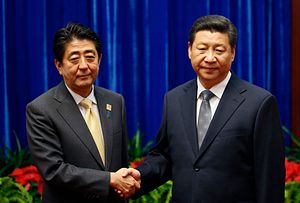Longtime Diplomat readers might remember that the final days of 2013 were slightly more turbulent than the final days of 2014, at least as far as Northeast Asian diplomacy was concerned. Japanese Prime Minister Shinzo Abe decided to visit the controversial Yasukuni Shrine at the end of 2013, drawing sharp reactions from both South Korea and China. While Yasukuni may no longer realistically be on Abe’s agenda since Japan’s economic woes look to have returned, leaving relatively less political capital available for nationalist muscle flexing compared to the situation in late-2013. Despite this, the fact that 2015 is the 70th anniversary of the end of the Second World War means we’re in for an interesting year in Northeast Asia regardless.
While the anniversary itself is a somewhat arbitrary milestone, the occasion will understandably draw statements of reflection from across the world and Northeast Asia is no exception. How Japan’s ruling Liberal Democratic Party’s (LDP) more conservative elements, including Abe himself, conduct themselves in the coming year will have important ramifications on the continuing salience of historical issues in keeping Japan from resolving its ongoing differences with China and South Korea.
Notably, Abe did not visit the Yasukuni Shrine in 2014 on the occasion of the 69th anniversary of Japan’s defeat in the Second World war. Abe did, however, send a note to a ceremony where war criminals were honored in his capacity as the head of the LDP and not the prime minister, drawing criticism. Yasukuni, where 14 Class-A Japanese war criminals and over 1,000 Class-B and Class-C war criminals, are enshrined, never fails to produce sharp condemnation from across the region. Indeed, even the United States, Japan’s treaty ally, noted its “disappointment” at Abe’s decision to visit the shrine in late 2013.
Going into 2015, Abe has much to lose by intentionally causing South Korea and China to react negatively to a potential Yasukuni visit or statements absolving or trivializing Japanese war crimes during the Second World War. After over 18 months of near-freeze, China-Japan relations experienced an awkward thaw when Abe and Chinese President Xi Jinping briefly shook hands and exchanged words at the APEC Leaders’ Summit last year. That meeting was the product of months of behind-the-scenes diplomacy and may have required Tokyo to make major concessions about the nature of the ongoing Senkaku/Diaoyu display. Additionally, Abe met South Korea’s Park Geun-hye for the first time in early 2014 and the two countries recently agreed to share intelligence on North Korea, marking positive diplomatic progress.
Realistically, I would be shocked if no senior LDP members or members of Abe’s administration took it upon themselves to visit Yasukuni to commemorate the 70th anniversary of Japan’s loss in the Second World War. This much has to be expected given the necessities of domestic politics. What will be interesting will be regional leaders’ behavior at international events to commemorate the end of the war. The impetus will be on Northeast Asia’s leaders to rise above the predictable route and work toward easing the pain from the still-fresh historical wounds that plague international relations in the region.
Memories of the Second World War remain more vivid for this region than perhaps any other. 2015 could, like many years before it, be hijacked by the history issue, resulting in another lost year where no real diplomatic progress occurs between Japan and China. At a time when public opinion and mutual perceptions continue to slide down into negativity in the region, positive change can only come from national leaders setting a positive example.

































